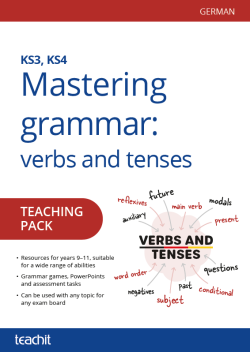Mastering grammar: verbs and tenses – German

Mastering grammar: verbs and tenses (German) is designed to teach and review the key verb forms and tenses required by the GCSE curriculum at both Foundation tier and Higher tier. It is suitable for use with key stage 3 and key stage 4 students across a wide range of abilities and is not specific to a particular exam board.
The aim of the pack is to make the grammar appear logical and accessible by drawing students’ attention to patterns through fun, communicative activities that are informed by aspects of Gianfranco Conti’s EPI approach, including 'mind reader', 'find someone who' and 'pyramid translation'.
What's included?
The pack consists of nine units, one on each of the following tenses / verb forms:
- present tense
- perfect tense
- imperfect tense
- future tense
- conditional tense and imperfect subjunctive
- modal verbs
- word order, including negatives and questions
- reflexive verbs
- the imperative and man
plus a review unit at the end.
The units are not intended as schemes of work but rather as a bank of ideas from which you can pick one activity or a series of activities at a level appropriate for your class. The examples used cover a variety of topics so that the activities can be integrated into your teaching at any point in the course. The vocabulary has deliberately been kept very simple, enabling students to concentrate on understanding and practising the grammar. There is particular focus on negatives and questions as examiners’ reports indicate that candidates often struggle with these.
Each unit includes:
- an explanatory PowerPoint
- awareness-raising activities (‘recognising the tense’)
- practice activities (ranging from receptive knowledge through structured production to freer practice)
- assessment tasks (receptive and productive knowledge)
- answers (for activities with ‘right/wrong’ answers).
The PowerPoint teaches the grammar point explicitly, starting with a comparison of the English tense / verb form with the German one. If you have weaker students, you could show them the explanatory PowerPoint after the activities, or not at all. If you have more able students or prefer a more traditional approach, you could show them the PowerPoint explanation before starting the activities.
Browse all our GCSE German verbs and tenses resources. See our other GCSE teaching packs, on vocabulary, translation, speaking and writing.
What's inside?
Introduction (pages 4–9)
1. Habits and routines: present tense (pages 10–22)
2. Past actions and events: perfect tense (pages 23–35)
3. Writing in the past: imperfect tense (pages 36–43)
4. Future actions, events and situations: present and future tenses (pages 44–59)
5. Imagined situations: conditional tense and imperfect subjunctive (pages 60–70)
6. Rules and possibilities: modal verbs (pages 71–79)
7. Word order: including negatives and questions (pages 80–96)
8. Reflexive verbs: present and perfect tenses (pages 97–103)
9. Orders and processes: the imperative and man (pages 104–107)
10. Verbs and tenses review (pages 108–116)
An extract from the teaching pack:
My personal information
Play in pairs. Student A must ask student B questions in German to find the missing information. Then swap roles. At the end, check you have the correct answers by looking at your partner’s grid.
|
Item of info. |
Student A |
Student B |
|
Name |
Lena |
|
|
Age |
16 |
|
|
From |
Österreich |
|
|
Number of siblings |
2 |
|
|
Number of pets |
0 |
|
|
Favourite music |
Rap-Musik |
|
|
Why favourite |
intelligent |
|
|
Holiday this year |
Kiel, Deutschland |
|
